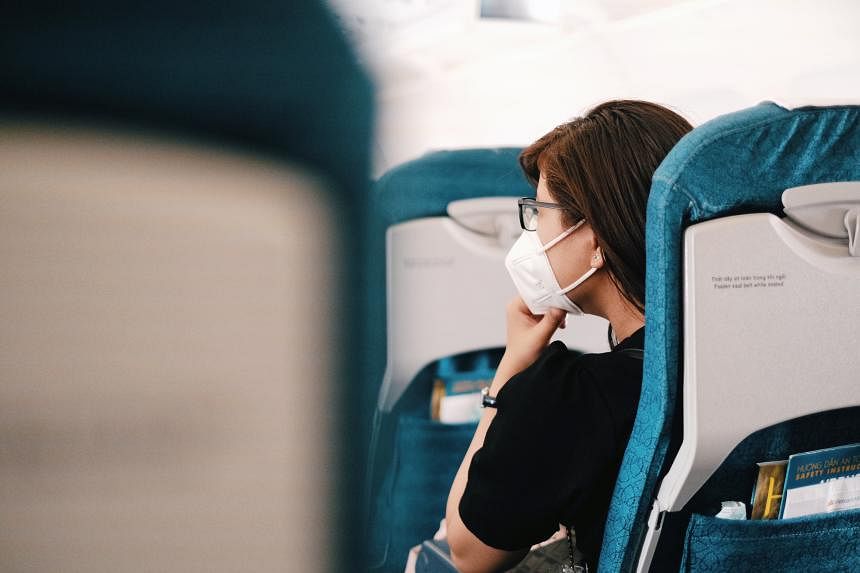SINGAPORE – With the school holidays and year-end festive season in full swing, more travellers are heading overseas despite countries in the region experiencing new Covid-19 waves and a rise in respiratory illnesses.
Countries in temperate regions, like China, have seen an increase in cases of respiratory illness among children and adolescents.
Meanwhile, Singapore – which considers the virus endemic – has seen a surge in Covid-19 cases, and so have Malaysia, Taiwan and Australia.
The Straits Times spoke to health and travel experts to find out if a Covid-19 patient should still board a plane, airlines’ policies on flying if a passenger is infected with the virus and if travel insurance can cover travellers for Covid-19 expenses.
Q: Should I board the plane if I test positive for Covid-19?
A: Infectious disease specialist Leong Hoe Nam said there are no requirements to report one’s Covid-19 status before flying, but travellers with the virus are discouraged from flying.
Dr Leong, who works at Mount Elizabeth Novena Hospital, advised travellers with Covid-19 who intend to fly to delay the trip as they could face relentless high fever or vomiting during the flight.
The infected traveller could also risk transmitting the virus to passengers and airline crew, he added.
“It is a social responsibility... Aeroplanes have high-efficiency particulate air (Hepa) filter circulation (which) reduces the spread of Covid-19. But all you need is one cough in front of you at the wrong time,” he said.
An earlier ST report said air filtration systems known as Hepa filters can remove about 99.97 per cent of airborne microbes, including viruses and bacteria.
Dr Leong warned travellers without Covid-19 to remain vigilant, adding that a person who tested negative for the virus before the flight can test positive subsequently and transmit the virus.
“This may be because of an early timing of a swab or a poor sample taken at the front of the nostrils instead of one-inch deep… The risk of transmission is highest just at the start or just before the onset of fever,” Dr Leong said.
He reminded travellers that a person with Covid-19 can be asymptomatic and that other passengers may not test themselves for the virus before travelling.
Dr Leong reiterated the importance of wearing a mask, adding: “The mask does reduce viral load even if it gets transmitted across. You are likely to end up with a milder illness.”
Q: What are some airlines’ policies on flying with Covid-19?
A: Major airlines advise passengers who test positive for Covid-19 to defer their travel plans to a later date to ensure the health and safety of their customers and staff.
A Singapore Airlines (SIA) spokesperson said all flight change and cancellation requests for medical reasons will be assessed on a case-by-case basis.
Customers who booked directly with SIA can reschedule or cancel their flight itineraries through its online assistance request form if they have medical reasons.
At Jetstar Asia, it is recommended that passengers purchase FareCredit, which enables customers to cancel a booking right up until airport check-in opens and get a credit voucher for the value of the flight, its spokesperson said.
According to Jetstar Asia’s website, FareCredit is available on selected international flights from Australia, and selected international flights from Singapore. It is tailored based on the trip, with the pricing available during the booking process.
Dr Leong added that normal adult patients with Covid-19 can return to travelling five days after contracting the virus, as there would be a low risk of transmission by then.
Q: What precautions should I take if I still want to travel despite being Covid-19-positive?
A: Mr Aaron Wong, seasoned traveller and founder of travel site MileLion, said travellers should delay travel unless the trip is urgent or unavoidable.
Travellers who test positive ahead of a trip and want to minimise the risk of spreading the infection should wear a mask, observe good personal hygiene and ensure social distancing, he added.
Mr Wong warned that travellers without Covid-19 should also take health precautions during their travels.
“If I have a trip coming up, I’d be sure to get my latest booster, at a bare minimum. If I see someone ill at the airport, I would keep my distance. And if my seatmate is ill, I would ask the airline crew if a seat switch is possible,” he said.
Q: Will I face any penalties if I decide to fly with Covid-19?
A: All travellers entering Singapore via air and sea checkpoints, including returning Singapore residents, have to fill up the SG Arrival Card within three days before their arrival.
One question in the card requires travellers to declare if they have fever, cough or other symptoms, and if they visited Africa, the Middle East and selected Latin American countries in the 14 days prior to arriving in Singapore.
According to the Immigration and Checkpoints Authority’s website, travellers who make false declarations may be prosecuted under the Infectious Diseases Act.
For committing an offence under the Act, a first-time offender can be jailed for up to six months and fined up to $10,000.
A repeat offender can be jailed for up to a year and fined up to $20,000.
Q: Does travel insurance cover me for Covid-19-related expenses?
A: Ms Annie Chua, head of personal lines at Income Insurance, said Covid-19 insurance benefits are included in the insurer’s travel plans for single trips and annual travel to provide customers with protection against the virus and peace of mind.
“Unforeseen circumstances could arise before or during your trip, and knowing that you are financially protected against a variety of travel inconveniences and risks, be it Covid-19, flight or baggage delays or medical emergencies is key to having peace of mind,” she added.
If one is diagnosed with Covid-19 by a medical practitioner before the trip, one can make a claim if the trip is postponed or cancelled, she added. Customers have to purchase their policy at least three days before they leave Singapore, to make a claim.
If a traveller catches Covid-19 while overseas, he can claim under the “trip disruption” benefit to cover expenses for an additional economy-class ticket for air, sea or land travel, or the administrative fees to change his ticket. Travel insurance can also cover accommodation – a standard room for one – to continue with the original scheduled trip.
When making a claim, customers must provide documentation from a medical practitioner, the local authorities or an airline to show that they are forced to change their original itinerary because of Covid-19, Ms Chua added.
Q: If I catch Covid-19 while on annual leave, can my employers reinstate my leave?
A: When employees catch Covid-19 during their annual leave, the handling of their leave days varies based on the employer’s policies and the Employment Act, said human resources expert David Leong.
Dr Leong, who is the managing director of human resources advisory firm PeopleWorldwide Consulting, said employers may opt to switch the affected leave days to medical leave but are not obligated to do so.
The decision often depends on the organisation’s leave policy and the specific circumstances of the illness. Some companies might decline to do so if they prioritise business needs over individual circumstances, he added.
If employers are flexible, employees are generally required to provide proof of their illness – for example, a medical certificate (MC) from a doctor and/or a photo of a positive antigen rapid test.
Q: Can an employee submit an MC issued by an overseas doctor to his employers?
A: Employees can submit to their employers an MC issued by an overseas doctor, but whether it will be accepted is up to an employer’s policy, Dr Leong said.
Using a telemedicine consultation to obtain the document from a Singapore doctor could be a practical solution, as some employers may require an MC issued by local doctors for administrative or legal reasons.
“This ensures that the MC aligns with local medical standards and practices, which might be more readily accepted by the employer. Additionally, telemedicine offers convenience, especially if the employee is still overseas or facing travel-related constraints,” Dr Leong added.



